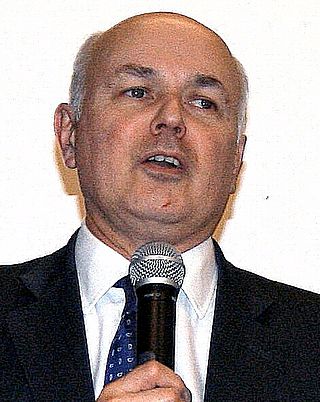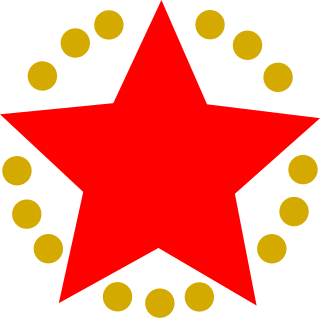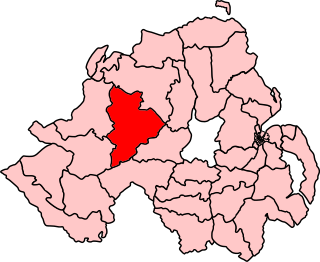The Fifth Republic Movement was a socialist political party in Venezuela. It was founded in July 1997, following a national congress of the Revolutionary Bolivarian Movement-200, to support the candidacy of Hugo Chávez, the former President of Venezuela, in the 1998 presidential election. The "Fifth Republic" refers to the fact that in 1997 the Republic of Venezuela was the fourth in Venezuelan history, and the Movement aimed to re-found the Republic through a constituent assembly. Following Chávez' 1998 election victory, this took place in 1999, leading to the 1999 Constitution of Venezuela.

The Provisional Legislative Council (PLC) was the interim legislature of Hong Kong that operated from 1997 to 1998. The legislature was founded in Guangzhou and sat in Shenzhen from 1996, until the 1997 handover when it moved to Hong Kong to temporarily replace the Legislative Council of Hong Kong.

The 2003 United Kingdom local elections were held on Thursday 1 May 2003, the same day as the Scottish Parliamentary and the Welsh Assembly elections. There were local elections for all councils in Scotland and in most of England. There were no local elections in Wales, Northern Ireland or London.

The Supreme People's Assembly is the legislature of North Korea. It is ostensibly the highest organ of state power and the only branch of government in North Korea, with all state organs subservient to it under the principle of unified power. However, in practice it is a rubber stamp legislature which exists to approve decisions made by the ruling party as a formality, and which has little to no real power of its own.
The Liberal Party of Cuba, was one of the major political parties in Cuba from 1910 until the Cuban Revolution in the late 1950s, when it was exiled.

The National Assembly of People's Power is the supreme organ of power of the Republic of Cuba. It is the only branch of government in the state, and per the principle of unified power, all state organs are subservient to it. It is currently composed of 470 representatives who are elected from multi-member electoral districts for a term of five years called consejos populares. The current President of the Assembly is Esteban Lazo Hernández. The Assembly only meets twice a year, with the 31-member Council of State exercising legislative power throughout the rest of the year. The most recent elections were held on 26 March 2023. The number of deputies was reduced from 605 to 470 for the 2023 election.
Vanni Electoral District is one of the 22 multi-member electoral districts of Sri Lanka created by the 1978 Constitution of Sri Lanka. The district covers the administrative districts of Mannar, Mullaitivu and Vavuniya in the Northern province. The district currently elects 6 of the 225 members of the Sri Lankan Parliament and had 253,058 registered electors in 2014. The district is Sri Lanka's Electorate Number 11.

The Cuban Revolutionary Party – Authentic, commonly called the Authentic Party, was a political party in Cuba most active between 1934 and 1952. Although the Partido Auténtico had significant influence, it eventually became unpopular due to corruption scandals and, despite significant reforms, Fulgencio Batista returned to power after a coup d’etat.

An indirect presidential election was held in Cuba on 24 February 2008, in which the National Assembly of People's Power elected a new President of the Council of State and the members of the Council of State. The election followed the January 2008 parliamentary election. In the election, Raúl Castro, who had been Acting President since July 2006, was elected as President of the Council of State, succeeding his older brother, Fidel Castro.

Mid Tyrone was a constituency of the Parliament of Northern Ireland.
Wanganui and Rangitikei was a parliamentary electorate that existed from 1853 to 1860, represented by two Members of Parliament.

Parliamentary elections were held in Cuba on 1 June 1950. The Partido Auténtico-Democratic Party-Liberal Party alliance won 42 of the 66 seats. It was the last free election held in Cuba on a national level.
Indirect parliamentary elections were held in Cuba on 2 November 1976, the first since the Cuban Revolution.
Parliamentary elections were held in Cuba on 24 February 1993 alongside elections to the fourteen Provincial Assemblies. Following the implementation of a new electoral law in 1992, voters now elected the National Assembly directly. Previously voters had elected members of the country's 169 municipal assemblies, who in turn had elected the National Assembly.

Ivan Pilip is a Czech politician and economist who was finance minister from June 1997 to July 1998, after having been the Minister of Education, Youth and Sport from 1994 to 1997.

Konstantin von Notz is a German lawyer and politician of the Alliance 90/The Greens party.

Parliamentary elections were held in Cuba on 11 March 2018 to elect members of the National Assembly of People's Power. Prior to the elections, President Raúl Castro declared he would not be seeking a new term, and a new President of the Council of State will be elected by the National Assembly. His deputy, Miguel Díaz-Canel, was subsequently elected as the new president. However, Castro remained the First Secretary of the Communist Party of Cuba, the most senior position in the country.

Parliamentary elections were held in Cuba on 26 March 2023 to elect members of the National Assembly of People's Power.

The 1978 Florida gubernatorial election was held on November 7, 1978. Democratic nominee Bob Graham was elected, defeating Republican nominee Jack Eckerd with 55.59% of the vote.










